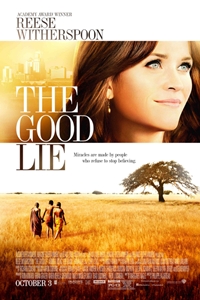By Eric Forthun of Cinematic Shadows
The Good Lie tells the story of the “Lost Boys of Sudan,” a group of Sudanese refugees that escaped the civil war in their native country to begin again in America. They faced hardships adapting to their new lives, particularly when one of the boys is separated from his sister when she is sent to another American city.
In the aftermath of 9/11, the refugee system came to a standstill. But refugees like Emmanuel Jal and Ger Duany, two of the film’s stars, made it to America and became successful after dealing with harrowing, heartbreaking circumstances as children.
Ger Duany commented on some of the most shocking things he encountered when he first arrived in America, remarking on a scene in the film  where a couple is making out in the airport while another man rides around on a motorized scooter. “I saw similar things, especially when I landed in New York City,” Duany said. He didn’t know people had the freedom to do such things. “People were all over and moving in a bunch of different directions. Where I come from, everyone moves in one direction and keeps going.”
where a couple is making out in the airport while another man rides around on a motorized scooter. “I saw similar things, especially when I landed in New York City,” Duany said. He didn’t know people had the freedom to do such things. “People were all over and moving in a bunch of different directions. Where I come from, everyone moves in one direction and keeps going.”
The film’s producer, Molly Smith, understood the struggles they faced when they landed in the United States. “Given his age and height, they just put him [Duany] in ninth grade,” Smith remarked incredulously. “Based on his height and apparent age, even though he didn’t know any English.”
“I didn’t know anything the teacher was saying,” Duany added.
Emmanuel Jal furthered their story by telling of his first encounter with a toilet, something we take for granted. “This thing is probably connected to a river…what if a snake comes out? I would squat and look down in case I needed to grab the snake and kill it,” Jal joked. “And I was once given soap that smelled like pineapple, so I ate it thinking it was food.”
Jal grew up in Kenya and moved to Switzerland, learning about American culture from films like Rambo and television shows like Tom & Jerry. His perception of America was based on what he had seen in popular culture, even remembering how he had learned about angels and connected that with white people, whom he had never seen. “And then I realized that they are just like me.”
Smith recalled stumbling onto the film two and a half years ago and connected with its unique story. “Reese Witherspoon shows up 35 minutes into the film and it’s not even about her,” Smith said, “so I understand why the story scared people. But we fell in love with how beautiful it was and we were blown away…as long as you can find the right tonal balance, which was real, we could make something great.”
The director insisted that he would make the film with real Sudanese refugees, which took about six months through a worldwide casting search to find the right choices. “It was an uphill production, to say the least,” Smith asserted.
The film takes place on the backdrop of an extended civil war between north and south Sudan, which has been going on since at least 1947. “How can you condense the decades of civil war into a single script?” Duany asked. “That’s what shocked me…this is the focus of the movie, the little kids in a land with which they are unfamiliar.” He wants there to be a film made about Sudan that handles the turmoil the country has faced, but the story remains unique due to its emphasis on the children.
“Everyone should treat this film as an educational tool,” Duany added. “This is a story for everyone who walks with two feet on this earth.”
Jal continued that point, elaborating, “Some people may find their purpose. As human beings, we connect with each other, and every human being can empathize with pain. Every person, every color, especially women, can connect with a troubled child that can make a difference.”
One moment occurred in Nashville, Tennessee, when a 21-year old man was outside near Duany by himself. “He was a very intelligent guy who had different problems than mine. ‘Right now I only have $800 to my name and I have rent coming up, and I don’t know what I’m going to do for a job,’ the main said…so I shared my life story with him.” He doesn’t want people to feel sorry for him, but rather that they know his story.
Jal wants people to know that he is a war child and a lost boy. “I’m trying to summarize that it’s a long journey and you shouldn’t let hope go. Focus your energy on the positive path and you’ll see a window.”
Their positivity shines through the film, since the Sudanese refugees are the focal point of a narrative that traditional Hollywood filmmaking would make easily digestible and simplistic. But The Good Lie becomes more than that and provides a startling, confident look at the struggles these boys faced and the heartfelt nature of their performances allows the film to define itself.
The Good Lie opens nationwide on Friday, October 3rd.









